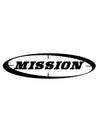WHY TITANIUM?

WHY MISSION USES TITANIUM
Corrosion Resistance – Mission’s titanium is corrosion proof in all naturally occurring environments. The MPK12-Ti knife was soaked in seawater for over four years without a hint of corrosion. We clean these blades in concentrated Hydrochloric acid.
Weight – Mission’s titanium is 40%-50% lighter than steel.
Heat and Cold Stability – Mission’s titanium is 800 degrees F more thermally stable than steel. Its thermal range is from -100 to over + 700 degrees F. It will not break in subzero weather; whereas, steel can shatter at -65 degrees F and ceramics are brittle at room temperatures.
Wear/Abrasion Resistance – Mission’s titanium is a self-healing metal that forms a titanium oxide ceramic skin over itself when scratched and has 5 times the abrasion resistance of steel. This gives it the ability retain an edge and resist being eroded by contact with outside materials such as dirt, sand, ice, mud, nylon webbing, rope, etc.
Superior Ductility (Percent Elongation) - The deformation that results from the application of a tensile force, and is calculated as the change in length divided by the original length. This is usually measured over a 5cm gauge length. The higher the number the better the ductility. The Navy Seals have been unable to break the titanium MPK12-Ti in almost twenty years of service. This is due to the 12% elongation, coupled with toughness and flexibility under load. It is the alloy of choice for jet landing gear.
Toughness – Mission’s titanium is tough at both high and low temperatures. Toughness is the relative resistance of the metal to breaking, cracking or chipping under impact or stress. Think of it as the opposite of brittleness. It should be noted that toughness and wear resistance are inversely proportional.
Flexibility – Mission’s titanium may be flexed or bowed repeatedly without undergoing rupture. It has 1/2 of the modulus of steel; therefore, it will bend at least twice as far before breaking.
Non-Poisonous – Mission’s titanium is non-poisonous and biologically inert. It is used as human replacement joints.
Strength-to-Weight Ratio – Mission’s titanium has superior strength-to-weight ratios when compared to either steel or ceramic. It is the alloy of choice for an aircraft.
Non Magnetic – Mission’s titanium is magnetically inert, and is used by the Navy Seals and Explosive Ordinance Disposal units (EOD) to defuse magnetically triggered mines.
A special titanium alloy designed for these blades is based on the unique properties inherent to the metal. This alloy is expensive and difficult to machine and grind, but the resulting blade is well worth the effort. It has very superior wear resistance and can be "thru-hardened" to Rockwell C47, while still maintaining it's flexibility. At this strength and hardness, cutting edge retention is superior and due to it's alloy content, corrosion (including seawater) will not dull the knife's cutting edge.
Extended field tests have shown that a V-ground titanium blade has an extremely strong edge which is not susceptible to the wear and chipping frequently found on steel blades, especially hollow ground steel. A unique serration design was also developed to provide the best surface possible for heavier materials.
The one-piece handle / hilt on the MPK series and MPT is injection-molded onto the full-length tang. It is made from a high toughness hytrel, strengthened, with ballistic fiber kevlar, and is resistant to the effects of heat, fuels, and oils, and solvents. Additionally, the hilt is textured and grooved for superior gripping and includes a lanyard hole. Either a metal cross-guard or butt cap is used to ensure that the hilt is 100% electrically insulated from the blade.

